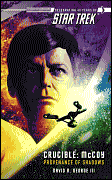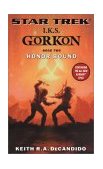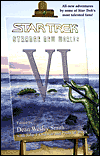
TOS: Crucible: McCoy, Provenance of Shadows, by David R. George
Book Review by David Roy
Have you read this book?
It's the 40th anniversary of Star Trek, and Pocket Books celebrates it with, along with a few other notable books, a trilogy written by David R. George III that takes an in-depth look at the three primary characters from the original series: Kirk, Spock, and McCoy. The first book of the "Crucible" series, Provenance of Shadows examines McCoy and his life, relationships, and events spanning almost an entire lifetime. It's very long (the longest Trek book ever, I think), but also very good.
All three books in the series will have a starting point of the death of Edith Keeler in the episode "City on the Edge of Forever," and this one has two alternating strands. The first, "modern-day" one looks at McCoy's life since the fateful day when James Kirk keeps him from preventing Edith Keeler's death when she's hit by a car in 1930. Pieces of episodes and movies are novelized, showing us different aspects of them, as well as things that we haven't seen before. Throughout these many years, McCoy and Spock are doing research to figure out some strange medical readings that they are committed to explaining. Along the way, we see how McCoy's love life continues to go from bad to worse. In the other strand, Kirk & Spock haven't arrived to stop McCoy from saving Edith's life, irrevocably changing history and stranding him in the past. We see him live his life and how he decides to move on from there. But the "current" McCoy is haunted by dreams that hint at this other life, and ultimately we find out just what one has to do with the other.
I will say right off the bat that George has a verbose prose style that hasn't enamored him to all readers. The level of detail in his descriptions as well as some of the plot tangents can make this a difficult read at times for some. I happen to love it, and I greatly loved this book as well. Since both strands of the plot look at McCoy and how he lives his life, there isn't a lot of action, but there are the occasional bits in the "current" storyline (especially vivid is a Klingon attack on the planet containing the Guardian of Forever). However, George's style is so evocative, his grasp of characters both major and minor so strong, that I was entranced.
The one thing that mars all of this, however, is the repetition of certain things. The chapters alternate between the modern day and the stranded McCoy, and occasionally when George gets back to a storyline he repeats information that he really doesn't need to. It's almost like he's making sure the reader remembers it, but often we just read it 30-40 pages ago. It seemed unnecessary and in an already long book, it was more padding than anything else. Thus, the book didn't really need to be quite this big.
That being said, George packs a lot into those pages. Repetition aside, there is little that is wasted. Both plots span years and we see McCoy's growth (and at times, his self-induced stagnation) very clearly. Some things are obvious, others are a surprise but are, in hindsight, logical developments. I especially liked the stranded McCoy's slow realization that his friends are never coming for him, that they might not even exist anymore. His strident attempts to leave clues for them before he realizes this are almost heart-breaking when you know they won't work. When he does finally move on from New York, the storyline, which was beginning to feel a little stale, takes on a new life with a new set of fascinating characters.
In fact, characterization is George's strong suit. He captures all of the familiar characters perfectly and makes the new characters interesting people. His prose style gives him a chance to make them all three-dimensional and he does that in spades. It is sad that a lot of character information and events happen "off-camera" and we have to be informed in a summary from the next chapter, but the book would be over 1000 pages if George didn't do it that way. Rest assured that all of the major events are shown.
One thing I really liked was the way George used continuity from the series. I'm not a fan of excessive or needless continuity, but I mostly reveled in the way George handles it. George actually portrays events from various episodes and some of the movies, giving us a different perspective on them. Other continuity references are kept low-key, merely mentions of events that bring a smile if you remember the episode but don't bog the book down if you don't. He fills in some things we didn't see (we actually see Admiral Nogura "draft" him at the beginning of Star Trek: The Motion Picture, for example) and shows us a different look to other events. We see the infamous conversation with Lt. Commander Data in "Encounter at Farpoint" from the elderly McCoy's perspective, to name another example. He also doesn't become a slave to the novel continuity, breaking it in a few places.
The ending of the book is poignant as we see the results of everything that happens in the book. We see how McCoy's relationships have always been poisoned, and we see how an alternate McCoy can affect the life of the "real" one for the better. We see McCoy go through romance after romance, never allowing himself to get too close to anybody in either timeline. While the story does occasionally drag, it never gets too slow before something interesting happens. However, if you're not a fan of character studies, this won't be the book for you.
Provenance of Shadows is an excellent beginning to the "Crucible" series, and David R. George has cemented his place as one of my favorite Trek authors with this book. Given the above caveats, this is a must-read for any fan of the original series.
All three books in the series will have a starting point of the death of Edith Keeler in the episode "City on the Edge of Forever," and this one has two alternating strands. The first, "modern-day" one looks at McCoy's life since the fateful day when James Kirk keeps him from preventing Edith Keeler's death when she's hit by a car in 1930. Pieces of episodes and movies are novelized, showing us different aspects of them, as well as things that we haven't seen before. Throughout these many years, McCoy and Spock are doing research to figure out some strange medical readings that they are committed to explaining. Along the way, we see how McCoy's love life continues to go from bad to worse. In the other strand, Kirk & Spock haven't arrived to stop McCoy from saving Edith's life, irrevocably changing history and stranding him in the past. We see him live his life and how he decides to move on from there. But the "current" McCoy is haunted by dreams that hint at this other life, and ultimately we find out just what one has to do with the other.
I will say right off the bat that George has a verbose prose style that hasn't enamored him to all readers. The level of detail in his descriptions as well as some of the plot tangents can make this a difficult read at times for some. I happen to love it, and I greatly loved this book as well. Since both strands of the plot look at McCoy and how he lives his life, there isn't a lot of action, but there are the occasional bits in the "current" storyline (especially vivid is a Klingon attack on the planet containing the Guardian of Forever). However, George's style is so evocative, his grasp of characters both major and minor so strong, that I was entranced.
The one thing that mars all of this, however, is the repetition of certain things. The chapters alternate between the modern day and the stranded McCoy, and occasionally when George gets back to a storyline he repeats information that he really doesn't need to. It's almost like he's making sure the reader remembers it, but often we just read it 30-40 pages ago. It seemed unnecessary and in an already long book, it was more padding than anything else. Thus, the book didn't really need to be quite this big.
That being said, George packs a lot into those pages. Repetition aside, there is little that is wasted. Both plots span years and we see McCoy's growth (and at times, his self-induced stagnation) very clearly. Some things are obvious, others are a surprise but are, in hindsight, logical developments. I especially liked the stranded McCoy's slow realization that his friends are never coming for him, that they might not even exist anymore. His strident attempts to leave clues for them before he realizes this are almost heart-breaking when you know they won't work. When he does finally move on from New York, the storyline, which was beginning to feel a little stale, takes on a new life with a new set of fascinating characters.
In fact, characterization is George's strong suit. He captures all of the familiar characters perfectly and makes the new characters interesting people. His prose style gives him a chance to make them all three-dimensional and he does that in spades. It is sad that a lot of character information and events happen "off-camera" and we have to be informed in a summary from the next chapter, but the book would be over 1000 pages if George didn't do it that way. Rest assured that all of the major events are shown.
One thing I really liked was the way George used continuity from the series. I'm not a fan of excessive or needless continuity, but I mostly reveled in the way George handles it. George actually portrays events from various episodes and some of the movies, giving us a different perspective on them. Other continuity references are kept low-key, merely mentions of events that bring a smile if you remember the episode but don't bog the book down if you don't. He fills in some things we didn't see (we actually see Admiral Nogura "draft" him at the beginning of Star Trek: The Motion Picture, for example) and shows us a different look to other events. We see the infamous conversation with Lt. Commander Data in "Encounter at Farpoint" from the elderly McCoy's perspective, to name another example. He also doesn't become a slave to the novel continuity, breaking it in a few places.
The ending of the book is poignant as we see the results of everything that happens in the book. We see how McCoy's relationships have always been poisoned, and we see how an alternate McCoy can affect the life of the "real" one for the better. We see McCoy go through romance after romance, never allowing himself to get too close to anybody in either timeline. While the story does occasionally drag, it never gets too slow before something interesting happens. However, if you're not a fan of character studies, this won't be the book for you.
Provenance of Shadows is an excellent beginning to the "Crucible" series, and David R. George has cemented his place as one of my favorite Trek authors with this book. Given the above caveats, this is a must-read for any fan of the original series.
|
Click here to buy TOS: Crucible: McCoy, Provenance of Shadows, by David R. George on Amazon
|
TOS: Crucible: McCoy, Provenance of Shadows, by David R. George on Amazon

| More Books You Might Like |
Comment on TOS: Crucible: McCoy, Provenance of Shadows, by David R. George
| Comments on TOS: Crucible: McCoy, Provenance of Shadows, by David R. George |
| There are no comments on this book. |



